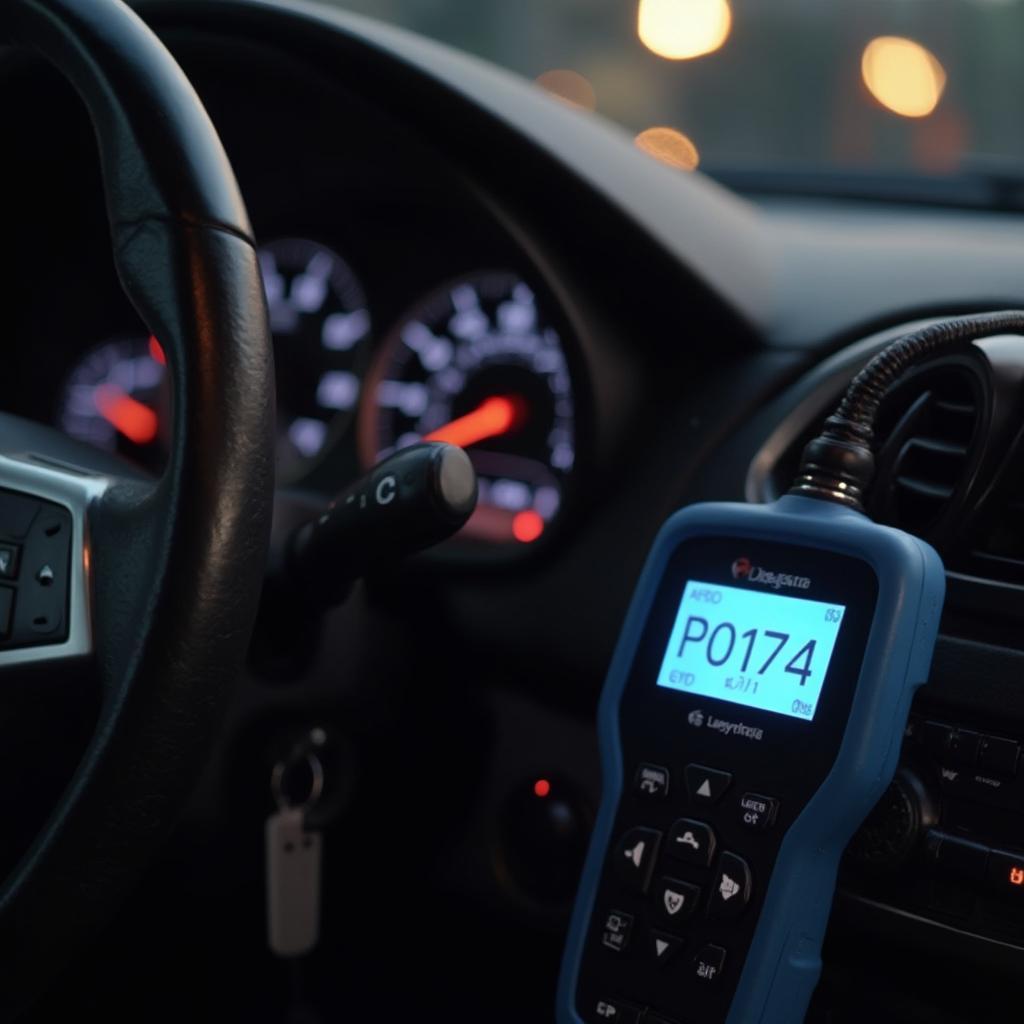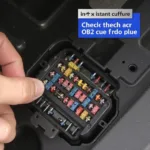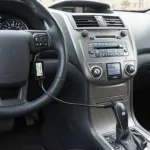The P0174 OBD2 code indicates a lean air/fuel mixture in bank 1 of your engine. This diagnostic trouble code (DTC) can be a frustrating issue, but understanding what it means and its potential causes can help you troubleshoot and fix the problem effectively. This article will guide you through everything you need to know about the P0174 code.
A P0174 code means your car’s computer has detected too much oxygen in the exhaust gases coming from bank 1. This signals a lean condition, meaning there’s more air than fuel in the air/fuel mixture. This can lead to reduced engine performance, decreased fuel economy, and potential damage to your engine if left unaddressed. It’s crucial to diagnose and resolve the P0174 code promptly. If you’re looking to upgrade your car’s audio and diagnostics capabilities, an OBD2 double din might be a good option.
What Does the P0174 Code Mean?
Specifically, the P0174 code refers to “System Too Lean (Bank 1).” “Bank 1” refers to the side of the engine containing cylinder number one. This distinction is important for vehicles with V-shaped engines (V6, V8, etc.) as they have two banks of cylinders. For inline engines, this distinction is irrelevant as there’s only one bank.
Common Causes of the P0174 Code
Several factors can contribute to a P0174 code. These include:
- Vacuum Leaks: A leak in the intake system can introduce unmetered air, disrupting the air/fuel ratio. Common culprits include cracked or disconnected vacuum hoses, faulty intake manifold gaskets, and a damaged PCV valve.
- Faulty Oxygen Sensor (O2 Sensor): The oxygen sensor measures the amount of oxygen in the exhaust and sends this information to the engine control unit (ECU). A malfunctioning O2 sensor can provide inaccurate readings, leading to the ECU miscalculating the air/fuel mixture.
- Fuel Injector Problems: Clogged or malfunctioning fuel injectors can restrict fuel flow, causing a lean condition.
- Low Fuel Pressure: Insufficient fuel pressure can starve the engine of fuel, resulting in a lean mixture. This can be due to a failing fuel pump, a clogged fuel filter, or a faulty fuel pressure regulator.
- Mass Airflow (MAF) Sensor Issues: The MAF sensor measures the amount of air entering the engine. A dirty or faulty MAF sensor can send incorrect readings to the ECU, causing it to deliver the wrong amount of fuel.
How to Diagnose a P0174 Code
Diagnosing a P0174 code involves a systematic approach to pinpoint the underlying cause. Here’s a step-by-step guide:
-
Read the Code: Use an OBD2 scanner to retrieve the code. Note any other codes present, as they might be related. You might consider building an OBD2 reader app for easier access to diagnostic information.
-
Inspect for Vacuum Leaks: Check all vacuum hoses, connections, and the intake manifold gasket for leaks. Use a carburetor cleaner or a smoke machine to identify leaks more effectively.
-
Check the Oxygen Sensor: Inspect the oxygen sensor for damage or contamination. Use a multimeter to test its functionality.
-
Test the Fuel Injectors: Examine the fuel injectors for clogging or leaks. You can use a noid light to test their electrical connection and a fuel pressure gauge to check fuel delivery.
-
Inspect the Fuel System: Check the fuel pressure and the fuel filter. A clogged fuel filter can restrict fuel flow and trigger the P0174 code.
If you need a comprehensive guide on connecting your OBD2 scanner to your Android Auto head unit, check out our article on OBD2 Bluetooth Head Unit Android Auto.
How to Fix a P0174 Code
Once you’ve identified the cause of the P0174 code, you can take the appropriate steps to fix it. This might involve replacing faulty components like the oxygen sensor, fuel injectors, or vacuum hoses. If you need a heads-up display to show your vehicle’s data, the Arestech 5.5 Inches A8 OBD2 Windshield HUD Head Up Display might be useful.
Conclusion
The P0174 OBD2 code indicates a lean air/fuel mixture in bank 1, which can lead to various engine performance issues. By understanding the causes and diagnostic procedures, you can effectively address this problem and ensure your engine runs smoothly. Remember, addressing the P0174 code promptly can prevent further damage and keep your vehicle running efficiently.
FAQ
-
What is a lean condition? A lean condition refers to an air/fuel mixture with too much air and not enough fuel.
-
Can a P0174 code damage my engine? Yes, a prolonged lean condition can lead to increased engine temperatures and potential damage to components like the catalytic converter.
-
Is it safe to drive with a P0174 code? While you can technically drive with a P0174 code, it’s best to address it as soon as possible to prevent further damage.
-
How much does it cost to fix a P0174 code? The cost of repair varies depending on the underlying cause. It can range from a simple fix like replacing a vacuum hose to more expensive repairs like replacing an oxygen sensor or fuel injector.
-
Can I fix a P0174 code myself? Depending on your mechanical skills and the specific cause, you might be able to fix it yourself. However, it’s always recommended to consult a qualified mechanic for complex repairs.
-
What other codes might accompany a P0174 code? Sometimes, you might see other codes related to the fuel system or emissions control system alongside a P0174 code.
-
Can a bad gas cap cause a P0174 code? While less common, a faulty gas cap can contribute to a lean condition by allowing fuel vapors to escape.
Other Questions and Resources
You might also find our article on “Does OBD2 test radio?” helpful if you’re interested in the capabilities of OBD2 scanners.
Need Help? Contact Us!
For any further assistance or inquiries regarding your OBD2 scanner or automotive diagnostic needs, feel free to reach out to our 24/7 customer support team via WhatsApp at +1(641)206-8880 or email us at [email protected].


